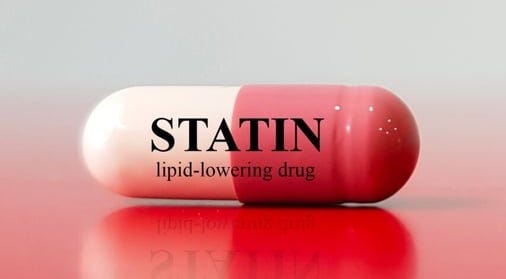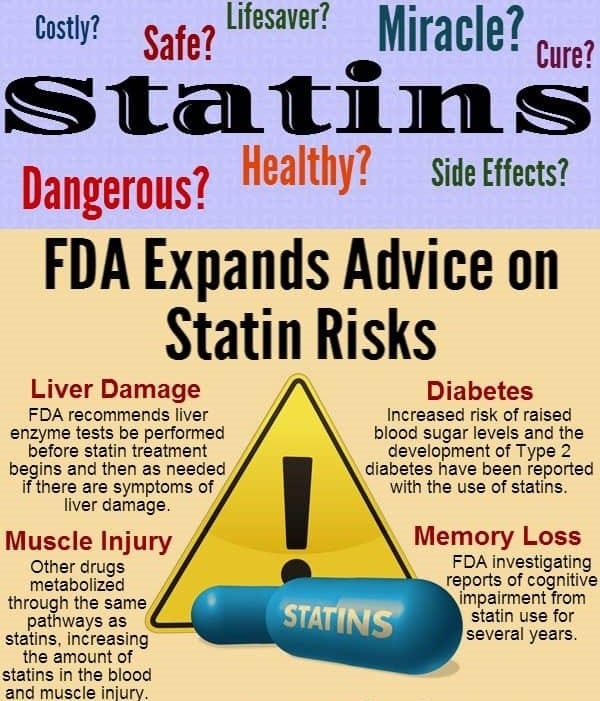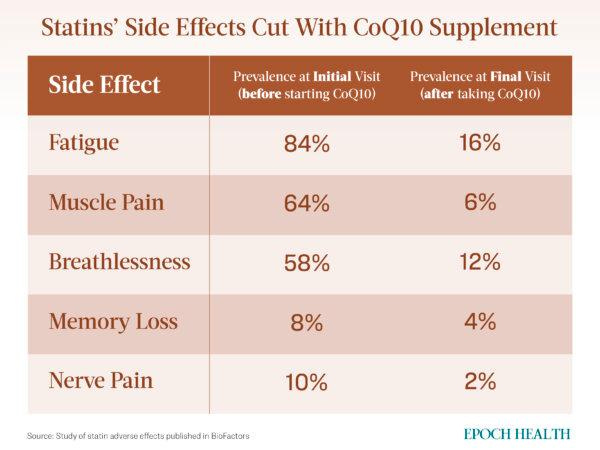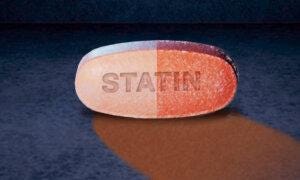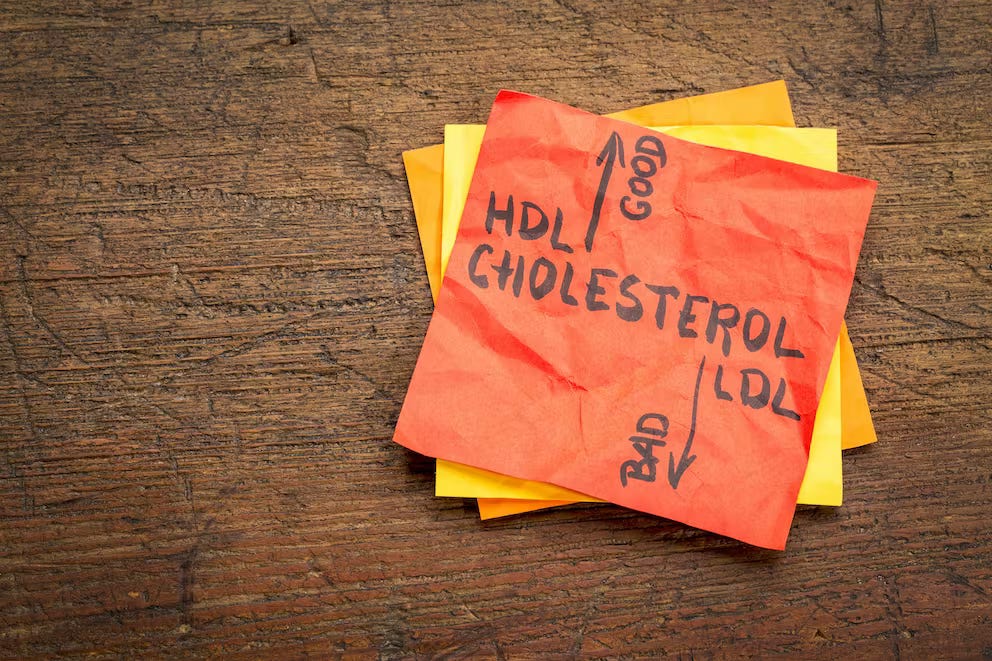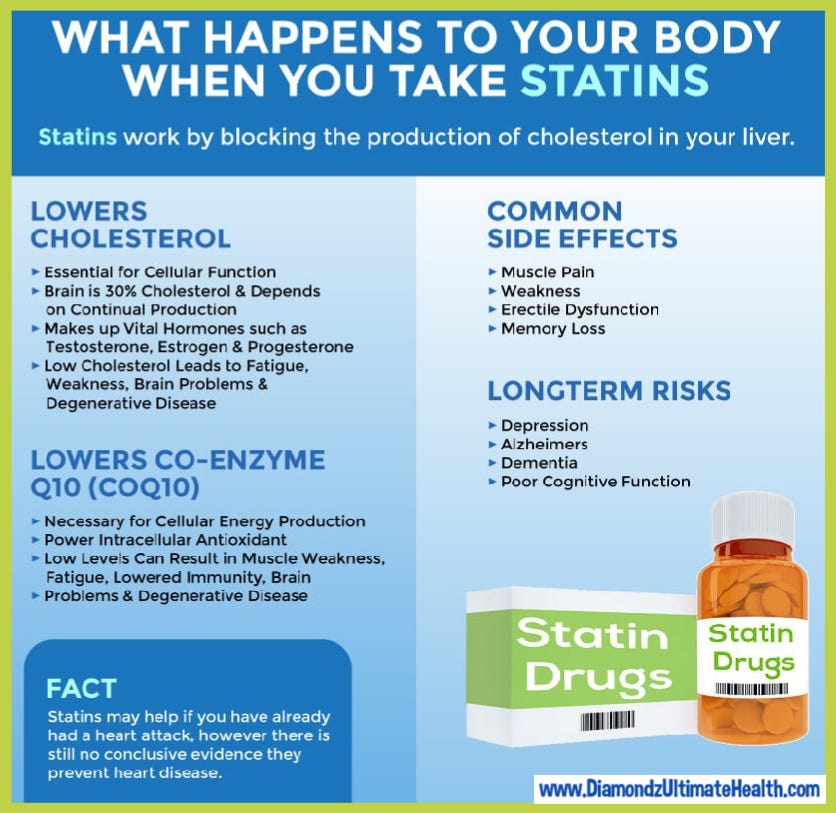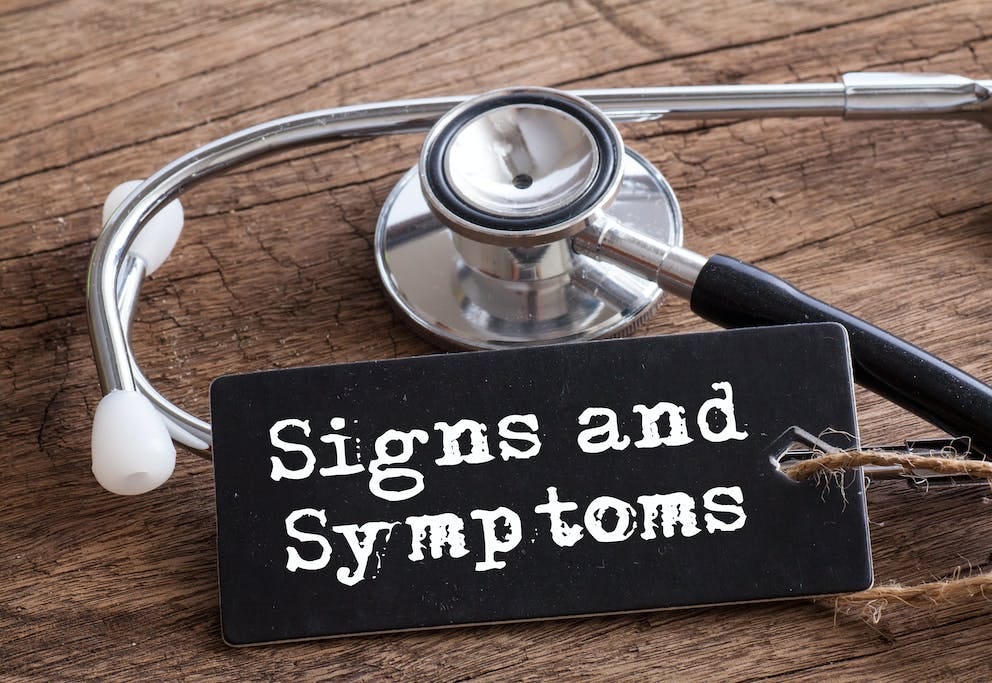Long-Term Use Of Statins Linked To Heart Disease
A new expert review suggests that long-term use of statins may be inadvertently aiding the enemy by accelerating coronary artery calcification...
Sources: The Epoch Times and Dr. Eric Berg
There are six Statin drugs available on the market today - Pitavastatin, Atorvastatin, Rosuvastatin, Pravastatin, Simvastatin and Fluvastatin. Common names people would recognize are: Lipitor, Crestor, Livalo and others. For decades, Statins have been heralded as the reliable heroes in the battle against heart disease, the leading cause of death in the United States and globally. However, this seemingly flawless reputation has been called into question.
A new expert review suggests that long-term use of Statins may be inadvertently aiding the enemy by accelerating coronary artery calcification instead of providing protection.
Statins Deplete Heart-Protecting Nutrients
The review, published in Clinical Pharmacology, suggests statins may act as “mitochondrial toxins,” impairing muscle function in the heart and blood vessels by depleting coenzyme Q10 (CoQ10), an antioxidant cells use for growth and maintenance. Multiple studies show statins inhibit CoQ10 synthesis, leading many patients to supplement.
CoQ10 is vital for producing ATP, the cell’s fundamental energy carrier. Insufficient CoQ10 inhibits ATP production, resulting in an energy deficit that the review authors say “could be a major cause for heart muscle and coronary artery damage.
“We believe that many years of statin drug therapy result in the gradual accumulation of mitochondrial DNA damage,” according to the authors.
A 2022 study published in Biophysical Journal linked reduced ATP to heart failure.
A 2008 study published in BioFactors reaffirms the statin–CoQ10 link. Researchers evaluated 50 statin patients for side effects like fatigue and muscle pain. All then stopped statins and supplemented CoQ10 for 22 months on average.
Heart function improved or held steady for the majority of patients. The researchers conclude statin side effects, including statin cardiomyopathy, “are far more common than previously published and are reversible with the combination of statin discontinuation and supplemental CoQ10.”
Statins Deplete Vitamin K, Raising Heart Calcification Risk
Statins impair the production of Vitamin K, an essential vitamin in managing calcification, according to the review. Optimal vitamin K2 intake helps avoid plaque buildup of atherosclerosis - thickening or hardening of the arteries and keeps calcification risk low.
Coronary calcification happens when calcium accumulates in the walls of the coronary arteries that provide oxygen to the heart. This plaque buildup is a sign of early coronary artery disease, which can block blood flow and trigger a heart attack.
A 2021 study published in the Kaohsiung Journal of Medical Sciences found a connection between statin use, coronary artery calcification, and vitamin K2 deficiency. The results shed light on how statins may spur arterial calcium accumulation by inhibiting vitamin K. The study’s findings were “in agreement with the existing evidence about positive association between statins and vascular calcification,” the authors added.
Statins also damage selenoproteins, carriers of the mineral selenium essential for heart health.
Related Stories
Re: 'Statins: The Lesser-Known Dangers, and a Good Alternative' by Vance Voetberg, Published in the Aug. 23–29 Edition
Statins: Most Prescribed Drug With Hyped Benefits and Downplayed Side Effects
Statins were also linked to increased calcification in a 2022 study published in Arteriosclerosis, Thrombosis, and Vascular Biology. However, the authors proposed that statins may encourage calcification by heightening inflammation rather than nutrient deficiency.
Physicians Overlook Statins as Driver of Heart Failure: Experts
Based on emerging evidence on statins’ potential cardiac downsides, the authors of the new review warn that “physicians in general are not aware that statins can cause heart failure and are clearly not recognizing it.” Though doctors readily diagnose heart failure in statin users, they usually attribute it to factors like age, high blood pressure, or artery disease.
Doctors prescribing cholesterol drugs “cannot ignore the moral responsibility of ‘informed consent,’” the researchers wrote, noting that patients deserve full disclosure of side effects like cardiovascular disease or heart failure.
With over a million annual heart failure hospitalizations in the United States, the condition is often referred to as an epidemic—and it may be that “statin drug therapy is a major contributing factor,” according to the review.
💥 Statin Articles at Natural News
CoQ10 and Statins: Impact on Cholesterol Levels
Understanding the complex relationship between CoQ10 and statins is vital for those aiming to balance heart health with overall wellness. This intricate interplay has significant implications, especially regarding managing cholesterol levels.
This post will discuss how statin medications control cholesterol levels, the role of liver cells in producing it, and its importance for body functions, including when there's a deficiency in bile salts.
We'll also explore the importance of cholesterol for body functions, including its crucial roles and what happens when there's a deficiency in bile salts.
While these medications can be helpful, they may have unwanted consequences. We will unpack common issues associated with statin usage, focusing on myopathy – a significant concern linked with these medicines.
More importantly, we'll discuss how taking CoQ10 supplements can help mitigate symptoms of myopathy caused by lowered coenzyme Q10 (CoQ10) levels due to statin use.
This comprehensive guide aims to shed light on potential health issues arising from the depletion of CoQ10 due to statins and how CoQ10 supplementation can alleviate these concerns while promoting optimal heart health.
Understanding Statins and Cholesterol
The superheroes of cholesterol control. They swoop in, block that pesky enzyme called HMG-CoA reductase, and save the day by reducing your cholesterol levels. Take that, heart diseases and stroke.
The Function of Statins in Controlling Cholesterol Levels
Statins work their magic by blocking HMG-CoA reductase, the mastermind behind cholesterol production in your liver. With this enzyme out of the picture, your liver produces less cholesterol, keeping your levels in check.
But wait, not all cholesterol is evil. Our bodies need cholesterol for essential tasks like building healthy cells and producing hormones. We should be wary of LDL cholesterol while celebrating the beneficial HDL.
Role of Liver Cells in Producing Cholesterol
Guess what? Your liver cells are the real MVPs when it comes to cholesterol production. They're responsible for about 75% - 80% of those pesky blood lipids, even if you eat a healthy diet. Talk about an inside job.
These liver cells are multitaskers. They create bile salts for digestion, synthesize fatty acids, and break down fats. It's like a lipogenesis party in there.
But wait, there's more. Circulating LDLs, the notorious "bad" cholesterols, also contribute to your body fat levels. They love forming arterial plaque and causing trouble. Watch out for those sneaky little troublemakers.
Importance of Cholesterol for Body Functions
Cholesterol gets a bad rap, but it's essential for our body's functions. Cholesterol, a waxy substance in every body cell, is critical for hormone production, vitamin D synthesis, and bile salt formation.
Vital Roles Played by Cholesterol in our Bodies
The liver produces most of your body's cholesterol, which is used for:
Hormone Production: It helps make essential hormones like cortisol, estrogen, and testosterone.
Vitamin D Synthesis: Cholesterol in your skin converts to Vitamin D when exposed to sunlight.
Bile Salt Formation: Cholesterol transforms into bile salts, which are needed for digesting fats and absorbing fat-soluble vitamins.
Health Implications Linked to Insufficient Bile Salts
If you don't have enough bile salts, you may have trouble digesting fats and absorbing essential nutrients. Low levels can also lead to gallstones or pancreatitis. So, maintaining optimal cholesterol levels is crucial for overall well-being, especially on high-fat diets like the ketogenic diet.
While statins help manage high LDL cholesterol levels, they should be used cautiously due to potential side effects. Always consult a healthcare provider before starting or stopping any medication regimen.
Unpacking Statin Side Effects
Be mindful of the potential repercussions of taking statins to keep your cholesterol in check. These drugs lower LDL ("bad") cholesterol but have a downside.
Common Side Effects of Statins
The most common side effects of statins include muscle pain, digestive problems, mental fuzziness, rash, and flushing. These usually subside as your body adjusts. Be wary of possible liver harm and higher glucose levels that may result in type 2 diabetes.
Muscle pain is a significant complaint among users. It can range from mild soreness to debilitating pain, making daily activities difficult.
Myopathy - A Significant Side Effect
Myopathy is often associated with high statin doses but can occur at any level. It disrupts muscle protein production, leading to inflammation and breakdown.
Doctors look for elevated creatine kinase (CK) levels when diagnosing myopathy. Not all patients with muscle issues will show raised CK values.
In extreme cases with high CK levels and severe symptoms, rhabdomyolysis may develop. This requires immediate medical attention.
CoQ10 Depletion Due To Statins And Its Implications
Great for cholesterol, but not so great for CoQ10. These drugs can zap your body's energy enzyme, leaving you feeling less than stellar.
The link Between Statins and Depletion of CoQ10
Statins not only block cholesterol production, but they also mess with mevalonate, a key player in CoQ10 synthesis. So, when you take statins, your CoQ10 levels take a nosedive. Bummer, right?
CoQ10 is like a little energy spark plug, especially for organs that need a power boost. But when it's in short supply, your cells might struggle to keep the lights on. Talk about a power outage.
Potential Health Issues Arising From Deficiency of CoQ10
Low on CoQ10? Brace yourself for some muscle mayhem. Weakness, pain, and even cognitive issues can creep up on you. And if that's not enough, heart failure risks might even skyrocket. Yikes.
Mitigating Symptoms of Myopathy with CoQ10 Intake
Statins, while effective in controlling cholesterol levels, can lead to specific adverse effects such as myopathy.
Statin use can lead to Coenzyme Q10 (CoQ10) depletion, which in turn causes myopathy symptoms such as muscle pain, tenderness, or weakness. However, there are ways to mitigate these side effects.
Efficacy of Using CoQ10 in Alleviating Myopathic Symptoms
Research suggests that supplementing your diet with CoQ10 could potentially help alleviate some symptoms tied directly to myopathy. CoQ10 is vital in cell energy production and is particularly important for maintaining healthy muscle function.
Notably, our bodies generate this enzyme, but its production can decrease with age or when taking certain drugs such as statins.
Taking CoQ10 supplements alongside your prescribed medication might be beneficial if you're experiencing any form of muscle discomfort due to statin usage.
A study in the American Journal of Cardiology found that taking 100mg of CoQ10 daily significantly improved muscular symptoms compared to those who didn't.
Dosage: The typical dosage ranges from 90 to 200 mg per day divided into two doses; however, you must consult your healthcare provider before starting any new supplementation regimen.
Safety: Generally speaking, taking up to 1200mg/day has been deemed safe according to studies, but again, it's best practice to consult with your doctor first, especially if you're already on other medications.
Potential Side Effects: While generally well-tolerated, possible side effects may include mild insomnia, rashes, or nausea, which usually subside after discontinuing use.
In addition to alleviating myopathic symptoms explicitly related to statin usage, supplementing with CoQ10 also comes packed with other health benefits.
For instance, it acts as an antioxidant, protecting us against oxidative stress and cellular damage, supports heart health, and even helps maintain optimal skin health.
To sum up, if you're currently on statins and experiencing uncomfortable side effects like muscle wasting or weakness, consider discussing adding a high-quality
Coenzyme Q10 supplement and your current treatment plan during your next visit to the doctor's office.
Conclusion
Understanding the CoQ10 and statins relationship is crucial for those taking cholesterol-lowering meds - it's like knowing the secret handshake to a healthy heart.
Statins are like the bouncers at the liver nightclub, making sure excessive cholesterol doesn't get in - but let's not forget that cholesterol has its own VIP perks, like hormone production and cell membrane formation.
Unfortunately, statins can have some not-so-fun side effects, like myopathy - a real party pooper that causes muscle weakness and pain by depleting CoQ10 levels.
But fear not; supplementing with CoQ10 can be the ultimate wingman, supporting your health while on statins.





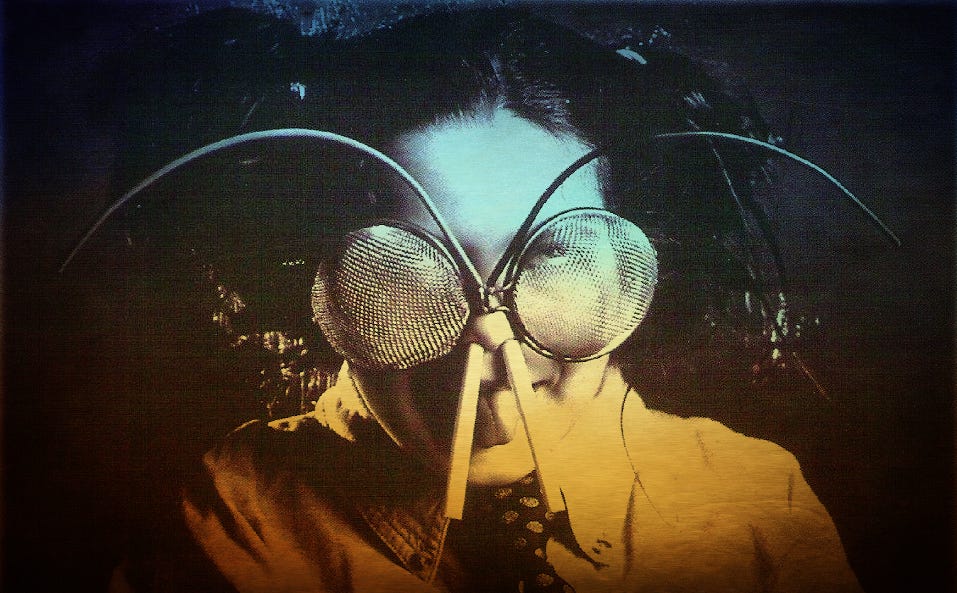


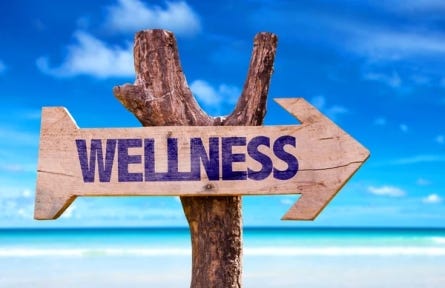

🛑 My Covid Vaccine Detox Remedies and Protocols Website: www.DiamondzDetox.com
🛑 EDTA Detoxification Chelation Cream: https://tinyurl.com/44tjt49j
🛑 Dr. Peter McCullough Recommends “Spike Support” With Nattokinase to Dissolve the Spike Protein From the Covid Jab, You Can Find it Here: Spike Support
🛑 Order Ivermectin – Hydroxychloroqine – Azithromycin (Z-Pack), Budesonide and Other Meds Online: www.BodywisePharmacy.com
🛑 Order Fenbendazole Here: FenBen Labs
🛑 Dr. Zev Zelenko’s Products Include “Z-Detox” For Covid Vaccine Protection – “Z-Flu” Protection Against Colds and Flu and “Z-Shield” which helps defend against dormant viruses. All Products Can Be Found Here: https://tinyurl.com/yc8zhusw
🛑 “Clean Slate” by ROOT Brands Provides a Full Body Detox Cleanse and Healing From Damage Caused By the Covid Vaccine Ingredients:
https://therootbrands.com/bodywisecbd
ROOT Brands CEO Christina Rahm Explains Her Incredible Products in This Video: https://tinyurl.com/bddyekfu.
🛑 High Grade Zeolite for Detox: https://tinyurl.com/53uxv89j
🛑 High Quality Vitamin B17/Apricot Seeds/Laetrile/Amygdalin Products Can Be Found Here: https://tinyurl.com/3bkctc98
🛑 Chlorine Dioxide (MMS): https://tinyurl.com/43kdtmr3



